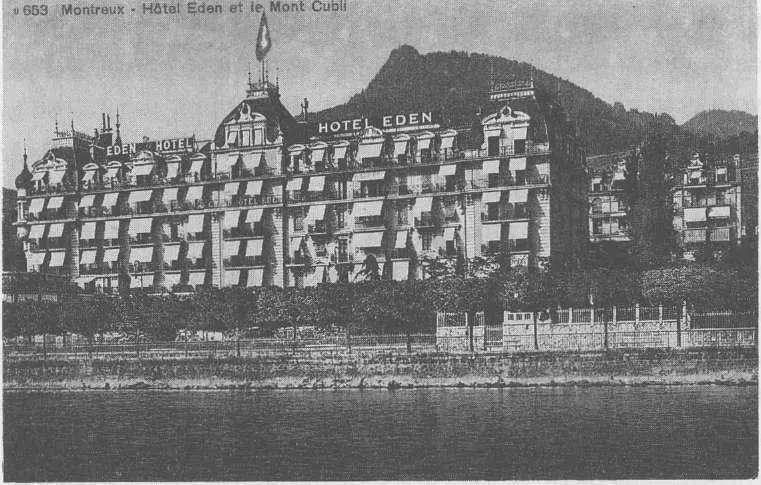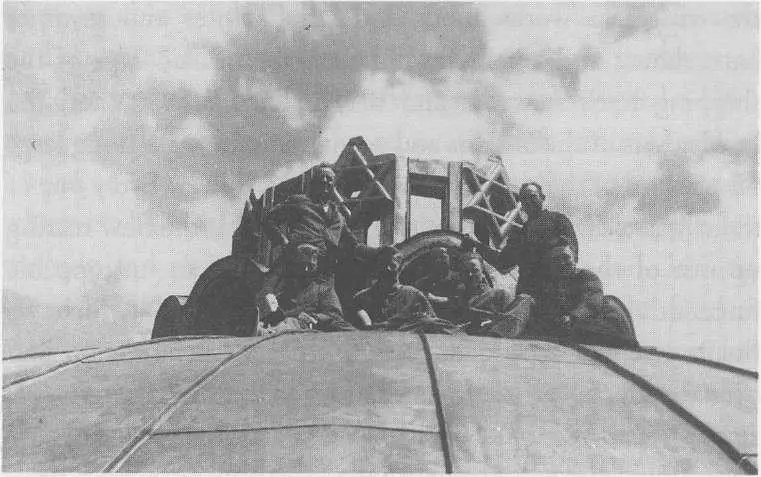
not only initiated into all the secrets of hotel life, but also learnt French to perfection, or rather, he absorbed it; he had the special gift of acquiring a foreign language, without apparent effort and without any teaching aids, within a year or two, solely by making certain adjustments (as he once explained to me) to his inner self. Along with very accomplished New York English he also spoke a most elegant French and an extremely dignified German, which astounded me the most, since he could hardly have had it from Gopprechts. Furthermore, Aunt Fini recalled, he had a far from elementary knowledge of Japanese, as I once discovered by chance when we were shopping together at Sacks' and he came to therescue of a Japanese gentleman who knew no English and was embroiled in some unpleasantness.
Once his Swiss apprentice years were over, Ambros went to London, with excellent recommendations and testimonials, where he took a job at the Savoy Hotel in the Strand in the autumn of 1905, again in room service. It was in his London period that the mysterious episode of the lady from Shanghai occurred. All I know of her is that she had a taste for brown kid gloves; although Uncle Adelwarth did make occasional references later to what he had experienced with this lady (she marked the beginning of my career in misfortune, he once said), I never managed to find out the true facts of the matter. I assume that the lady from Shanghai — whom I always associated, doubtless absurdly, with Mata Hari — often stayed at the Savoy, and that Ambros, who was now about twenty, had contact with her professionally, if one can put it like that. It was the same with the counsellor from the Japanese legation whom he accompanied — in 1907, if I am not mistaken — on a journey by ship and rail via Copenhagen, Riga, St Petersburg, and Moscow, right across Siberia, to Japan, where the unmarried gentleman had a wonderful house set in a lake, near Kyoto. Ambros spent almost two years, partly as valet and partly as the counsellor's guest, in that floating and well-nigh empty house, and as far as I am aware he felt happier there than he had been anywhere else until then. Once, at Mamaroneck, said Aunt Fini, Uncle Adelwarth spent all of one afternoon telling me about his time in Japan. But I no longer remember exactly what he told me. Something about paper walls, I think, about archery, and a good deal about evergreen laurel, myrtle and wild camellia. And I remember something about

an old hollow camphor tree which supposedly had room for fifteen people inside it, a story of a decapitation, and the call of the Japanese cuckoo, said Aunt Fini, her eyes half closed, hototogisu, which he could imitate so well.
After morning coffee on the second day of my stay at Cedar Glen West, I went over to Uncle Kasimir. It was about half past ten when I sat down at the kitchen table with him. Lina was already busy at the stove. My uncle had produced two glasses and poured out the gentian brandy I had brought. In those days, he began, once I had managed to steer the talk to the subject of emigration, people like us simply had no chance in Germany. Only once, when I had finished my tinsmith apprenticeship in Altenstadt, did I get work, in '28, when they were putting a new copper roof on the synagogue in Augsburg. The Jews of Augsburg had donated the old copper roof for the war effort during the First World War,

and it wasn't till '28 that they had the money they needed for a new roof. This is me, said Uncle Kasimir, pushing across the table a framed postcard-size photograph he had taken down from the wall — at the far right, from where you're looking. But after that job there was nothing again for weeks, and one of my mates, Josef Wohlfahrt, who still felt confident about things when we were at work up on the synagogue roof, later hanged himself in despair. Fini wrote enthusiastic letters from her new homeland, so it was no wonder that I finally decided to follow my sisters to America. Of the rail journey across Germany I remember nothing, except that everything seemed unfamiliar and incomprehensible to me — the country we passed through, the huge railway stations and cities, the Rhineland and the vast flatlands up north — most probably because I had never been beyond the Allgàu and the Lechfeld region. But I do still see the offices of Norddeutscher Lloyd in Bremerhaven quite clearly in front of me. The passengers with little money were obliged to wait there till they could embark. I particularly remember the many different kinds of head-gear the emigrants wore: hoods and caps, winter and summer hats, shawls and kerchiefs, and then the peaked caps of the shipping line's stewards and the customs officers, and the bowler hats of the brokers and agents. On the walls hung large oil pictures of the ocean liners of the Lloyd fleet. Every one of them was cleaving a course full steam ahead, the bow rearing up out of the waves, conveying a sense of an unstoppable force driving onward. Above the door through which we finally left was a circular clock with Roman numerals, and over the clock, in ornate lettering, was the motto Mein Feld ist die Welt.
Aunt Lina was pushing boiled potatoes through a press onto a floured pastryboard, and Uncle Kasimir, pouring me another gentian, went on to describe his crossing in the teeth of the February storms. The way the waves rose up from the deep and came rolling on was terrifying, he said. Even as a child I used to be horrified when the frog pond was frozen over, and we played curling on the ice, and I would suddenly think of the darkness under my feet. And now, nothing but black water all around, day in, day out, and the ship always seeming to be in the selfsame place. Most of my fellow travellers were sea-sick. Exhausted they lay in their berths, their eyes glassy or half closed. Others squatted on the floor, stood leaning for hours against a wall, or tottered along the passageways like sleepwalkers. For a full week, I too felt like death. I did not begin to feel better until we cleared the Narrows into Upper Bay. I sat on a bench on deck. The ship had already slowed. I felt a light breeze on my forehead, and as we approached the waterfront Manhattan rose higher and higher before us out of the sunshot morning mists.
My sisters, who were waiting for me on the quayside, were not able to be of much help, nor could Uncle Adelwarth find anything for me, because I was no use as a gardener or cook or servant. On the day after my arrival I rented a back room that looked out on a narrow air shaft, from Mrs Risa Litwak in Bayard Street on the Lower East Side. Mrs Litwak, whose husband had died the year before, spent the whole day cooking and cleaning, or if she wasn't cooking and cleaning she was making paper flowers or sewing all night for her children or for other people, or as a supply sempstress for some business or other. Sometimes she played on a pianola very pretty songs that I seemed to know from somewhere. Until the First World War, the Bowery and the whole Lower East Side were the districts where the immigrants chiefly came to live. More than a hundred thousand Jews arrived there every year, moving into the cramped, dingy apartments in the five- or six-storey tenement blocks. The so-called parlour, which faced the street, was the only room that had two windows, and the fire escape ran past one of them. In the autumn, the Jews would build their sukkahs on the fire escape landings, and in summer, when the heat hung motionless in the city streets for weeks and life was unbearable indoors, hundreds and thousands of people would sleep outside, up in the airy heights, or even on the roofs or sidewalks or the little fenced-off patches of grass on Delancey Street and in Seward Park. The whole of the Lower East Side was one huge dormitory. Even so, the immigrants were full of hope in those days, and I myself was by no means despondent when I started to look for a job at the end of February '28. And before the week was out I already had my place at a workbench, at the Seckler & Margarethen Soda and Seltzers Works near the sliproad up to Brooklyn Bridge. There I made stainless-steel boilers and vats of various sizes, and old Seckler, who was a Jew from Briinn (I never did find out who Margarethen was), sold most of them as "catering equipment" to illicit distilleries where the concern was far less about the asking price than about doing business with the utmost discretion. Seckler, who for some reason took a liking to me, said that the sale of these steel vats and all the rest of the plant
Читать дальше















